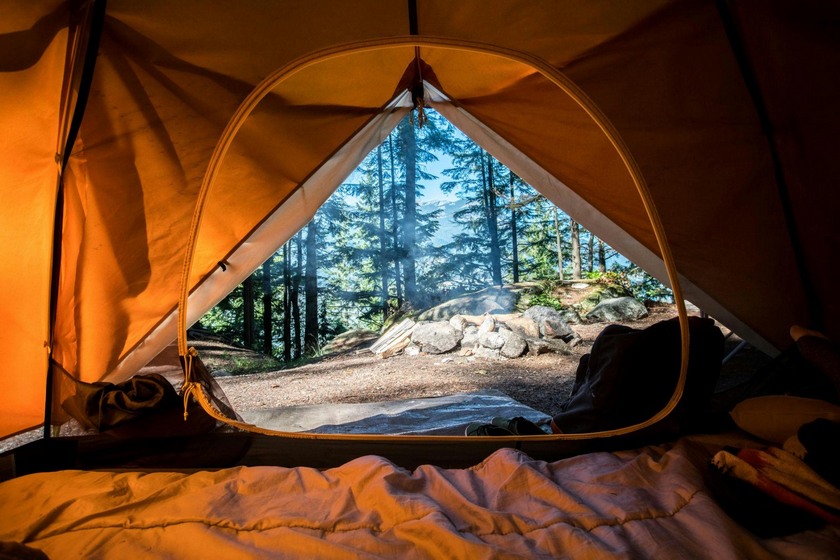If you’re an ardent camper, you may be aware of how you need to prepare for this type of adventure. You may have heard of pop-up campers, popular among all campers inside and outside the US. Some may prefer to use these on their camping trips, while others may not be so eager. This list of pop-up camper pros and cons will help you decide whether this is the most suitable option for your camping trip. First, let’s see what exactly a pop-up camper is and then dive into the rest of the details.
What Are Pop-Up Campers?
A pop-up camper is a type of towable trailer with a collapsible roof. Pop-up campers, also known as fold-out campers and tent trailers, are ideal for camping as they provide ample space. Furthermore, they are easy to store once folded up due to their compact height. Pop-up campers come with various amenities, allowing you to choose the features that best suit your camping trip.
What Is The Weight Of A Typical Pop-Up Camper?
The average weight of a pop-up camper is approximately 2,000 lbs. However, the weight may change according to the type of pop-up camper and the features it includes. Depending on the model, a pop-up camper’s weight can range between 1,750 and 3,000 lbs.
Pop-Up Camper Pros And Cons
Here are the advantages and disadvantages of using pop-up campers on your camping trips.
Pros of Pop-up Campers
- Lightweight: Pop-up campers are relatively lightweight compared to other camping options due to their simple design and lightweight materials, such as canvas. As a result, they are much lighter than conventional camping vehicles like RVs and hard-sided trailers.
- Affordable: Pop-up campers are more budget-friendly than RVs and larger camping vehicles. They make an ideal choice for beginner campers looking to start their camping adventures without a significant investment.
- Easy to Maintain: Maintaining a pop-up camper is generally more straightforward than other camping vehicles. While complexity can vary by model, overall, pop-up campers have fewer complicated systems that may require repairs.
- Safe and Easy to Tow: The lightweight nature of pop-up campers makes them easier to tow than larger trailers. Even smaller vehicles can tow pop-up campers, eliminating worries about vehicle reliability on your camping trip.
- Easy to Store: Storage is often a concern with larger camping vehicles, but this is not the case with pop-up campers. Their collapsible design allows them to fit into standard-sized spaces, making storage simple and cost-effective.
- Heating and Air Conditioning Options: Depending on the model, pop-up campers can come equipped with heating or air conditioning facilities, providing comfort during extreme weather conditions.
- Feels Like Sleeping Outdoors: Sleeping in a pop-up camper retains the outdoorsy feel, allowing campers to connect with nature while enjoying some comforts inside. Moreover, with temperature control options, you can still experience nature without sacrificing comfort.

Cons of Pop-Up Campers
- Tents Require Diligent Care: Although pop-up campers have low maintenance, the material used for the tent awning and sides can be a hassle to care for. If your camper gets wet, ensure proper airing to prevent mold build-up.
- Limited Sleeping Capacity: Pop-up campers generally accommodate only a couple of people, which can pose challenges when camping with groups. Nevertheless, various extensions can be added to increase capacity.
- No Toilet Facilities: The compact design of pop-up campers limits the inclusion of toilet facilities. Typically, a “wet bath,” where the toilet and shower are combined, may be present, but full bathrooms are not feasible.
- Some Locations Have Safety Restrictions: Certain camping areas in the US may prohibit pop-up campers due to safety concerns, particularly in regions with wildlife. In these cases, hybrid campers made from sturdier materials might provide another option.
- More Setup and Tear-Down Time: While pop-up campers are portable, they require time to set up and take down at each campsite. Consequently, transitioning from one location to another may involve additional effort.
- Lightweight Models Can Tip Over: The lighter weight of pop-up campers can sometimes make them susceptible to tipping in harsh weather conditions, such as high winds.
Final Thoughts
A pop-up camper is an excellent vehicle for your camping trips. Its lightweight, collapsible design is compatible with easy setup and requires less maintenance. Pop-up campers are also more affordable compared to RVs and traditional trailers, making them a suitable option for campers of all levels. However, it’s essential to be mindful of potential instability in extreme weather conditions and specific area restrictions. When embarking on a camping adventure, ensuring you pack all necessary gear, such as a first-aid kit, food, water, and a long-range flashlight, is crucial for a safe and enjoyable experience.
Frequently Asked Questions
How Long Do Pop-Up Campers Last?
A high-quality, well-maintained pop-up camper could last between 10 and 15 years.
Can You Camp With A Pop-Up In The Winter?
A pop-up camper is not recommended for harsh weather conditions, as its lightweight materials may not provide adequate protection. In extreme snow and windy conditions, it’s better to consider a different type of camping vehicle.
What Are Pop-Up Campers Good For?
Pop-up campers are ideal for those seeking an affordable camping option that offers limited space and amenities, making them suitable for casual camping experiences.





